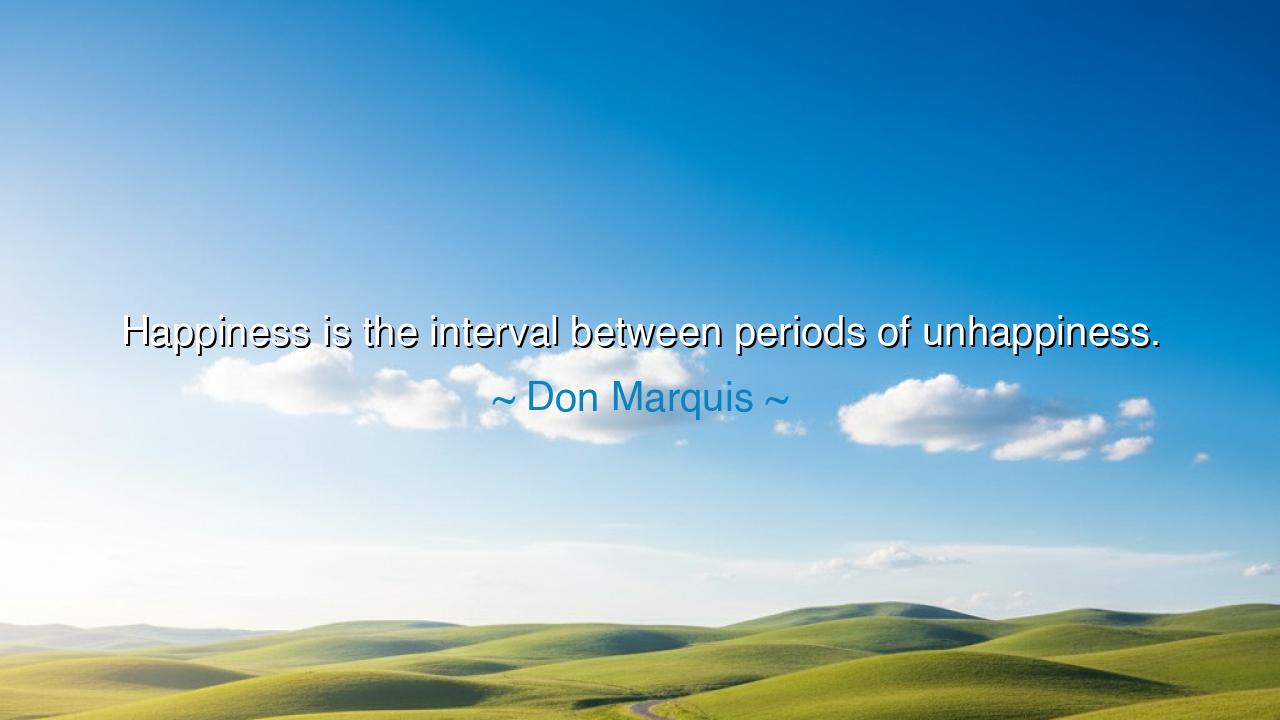
Happiness is the interval between periods of unhappiness.






“Happiness is the interval between periods of unhappiness.” Thus spoke Don Marquis, the American poet and philosopher of humor and irony, whose words—though simple in form—carry the weight of deep human truth. With this saying, he captured the rhythm of life itself: the rise and fall of emotion, the alternating tides of joy and sorrow that shape the soul. His insight is not one of despair, but of understanding. For he teaches that happiness is not a permanent state, but a moment of grace, a luminous pause between the tempests of existence. To expect endless joy is to deny the nature of life; to cherish its brief visits is to live wisely and well.
In this quote, Marquis unveils the paradox of human longing. All men seek happiness, yet few realize that it cannot exist without its opposite. Unhappiness, like the shadow, gives shape to the light. Were life to be unbroken bliss, joy would lose its meaning. We would no longer know gratitude, for nothing would contrast it. Just as the sailor appreciates calm only after surviving the storm, so too does the heart value happiness because it knows sorrow. Thus, Marquis reminds us that life’s beauty is not in unchanging peace, but in the fleeting intervals when peace descends upon us like sunlight between clouds.
The origin of Marquis’s wisdom lies in his life as both a writer and observer of the human condition. Living through the hardships of the early twentieth century, he witnessed poverty, war, and the weariness of modern existence. Yet he met these with wit rather than despair. In his creation of “Archy and Mehitabel,” a cockroach and a cat who philosophized about life, Marquis found humor in suffering and meaning in struggle. His words on happiness, therefore, are not cold resignation—they are a smile born of endurance. He understood that life’s worth is measured not by the absence of sorrow, but by the courage to keep seeking joy in its midst.
Consider the life of Abraham Lincoln, whose laughter was often shadowed by melancholy. He lost his mother as a boy, his beloved sons as a man, and carried the unbearable weight of a nation at war. Yet he still found time to tell stories, to laugh with his friends, and to dream of a peaceful tomorrow. His happiness was not constant—it came in fragile intervals, in moments of humor, reflection, and love. And yet those brief intervals sustained him through years of sorrow. Lincoln’s life teaches us what Marquis meant: that happiness is precious precisely because it is fleeting, and that even small moments of peace can illuminate long stretches of darkness.
This truth can feel heavy to those who long for everlasting joy, but it is, in fact, a liberation. For once we understand that happiness is not a permanent crown but a passing visitor, we cease to chase it desperately. We begin instead to savor it when it comes—to greet it with gratitude and let it go without bitterness. We realize that unhappiness, too, has its purpose: it deepens our empathy, strengthens our character, and makes the return of happiness all the more radiant. The wise do not flee from sorrow—they walk through it, knowing that it will pass, and that joy will one day return to them like the dawn.
Happiness, then, is not an achievement but a rhythm. It lives in the small pauses between struggle and recovery, between loss and healing. It is found in laughter shared after tears, in quiet evenings after long days of toil, in forgiveness after anger. Marquis reminds us that to live fully is not to avoid pain, but to move gracefully through its cycles. The world itself moves in this rhythm: day follows night, spring follows winter, and the heart learns again and again to open after breaking.
Let this be the teaching for all who seek contentment: do not chase happiness as if it were a distant treasure buried in the earth. It is already woven into the fabric of your days, hidden in moments so ordinary they often pass unseen. When sorrow comes, accept it as part of the grand design; when happiness visits, welcome it as a sacred guest. Live neither clinging to one nor fleeing the other, but embracing both as the pulse of existence. Then you will see, as Don Marquis saw, that happiness is not lost in the storm—it is the stillness between the waves, the golden interval that gives the ocean of life its meaning.






AAdministratorAdministrator
Welcome, honored guests. Please leave a comment, we will respond soon